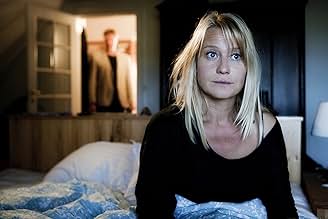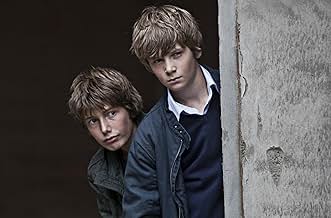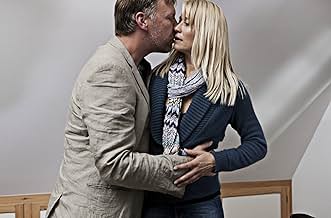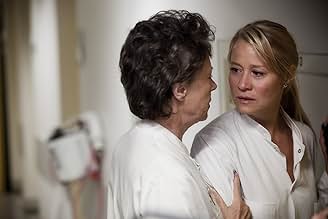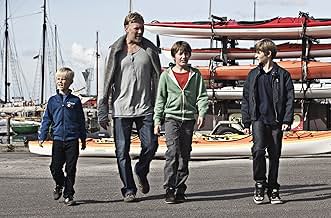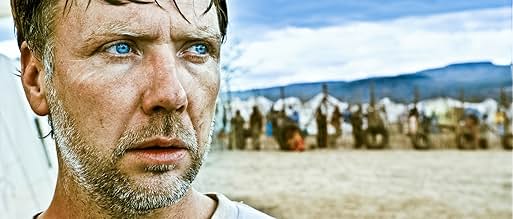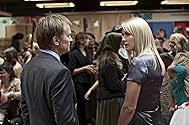VALUTAZIONE IMDb
7,6/10
42.563
LA TUA VALUTAZIONE
Le vite di due famiglie danesi si incrociano e nasce un'amicizia straordinaria ma rischiosa. Ma la solitudine, la fragilità e il dolore sono in agguato.Le vite di due famiglie danesi si incrociano e nasce un'amicizia straordinaria ma rischiosa. Ma la solitudine, la fragilità e il dolore sono in agguato.Le vite di due famiglie danesi si incrociano e nasce un'amicizia straordinaria ma rischiosa. Ma la solitudine, la fragilità e il dolore sono in agguato.
- Regia
- Sceneggiatura
- Star
- Vincitore di 1 Oscar
- 14 vittorie e 24 candidature totali
Wil Johnson
- Najeeb
- (as Will Johnson)
Eddy Kimani
- Patient
- (as Eddie Kimani)
Mary Ndoku Mbai
- Patient
- (as Mary Nduku Mbai)
William Jøhnk Nielsen
- Christian
- (as William Jøhnk Juel Nielsen)
Satu Mikkelinen
- Hanna
- (as Satu Helena Mikkelinen)
Recensioni in evidenza
This movie is a far more direct and disturbing probe into some of our more troubling inclinations than anything I've seen since becoming a fan of Lars von Trier's movies. The topic here is vengeance and its consequences, more or less. I was a little surprised to find it had been directed by a woman, Susanne Bier. I've always thought women would be good at this kind of near melodrama but have never actually seen one tackle such a project, to my knowledge. The story centers around two boys and their developing reaction to first school house bullying, but then a much more serious instance of it in their home life. The acting is beautifully done and none of the leads seem to have held back in the slightest. One dad is a doctor who, it appears, donates his services to a part of Africa wrought with violence. Despite his obvious good nature, he and his wife, also a doctor, are having problems.
It's unusual in my experience to have a woman show just how much more selfless a man might be than his wife, but that is exactly what is done here. And it's quite refreshing. But the sweep and breadth of this movie is quite satisfying on its own, spanning from Africa to modern day Denmark. This is a trip I wouldn't hesitate recommending to anyone.
It's unusual in my experience to have a woman show just how much more selfless a man might be than his wife, but that is exactly what is done here. And it's quite refreshing. But the sweep and breadth of this movie is quite satisfying on its own, spanning from Africa to modern day Denmark. This is a trip I wouldn't hesitate recommending to anyone.
'IN A BETTER WORLD': Three and a Half Stars (Out of Five)
This Danish drama won Best Foreign Language Film at the 83rd Academy Awards (as well as the 2011 Golden Globe). It deals with violence in Denmark among children when two ten year olds meet at school and form an unhealthy alliance against bullies. The film was titled 'Haevnen' in Danish which means 'The Revenge'. It was directed by Susanne Bier and written by Anders Thomas Jensen. It stars Swedish actor Mikael Persbrandt (and some of the film is spoken in Swedish, as well as English) as well as Trine Dyrholm, Ulrich Thomsen, William Johnk Nielsen and Markus Rygaard. I found the film interesting and well made but not nearly as good as all the critical acclaim and accolades it's gotten.
The film focuses on a boy named Elias (Rygaard) who is constantly picked on and abused by bullies at his school in Denmark. His father, Anton (Persbrandt), is a doctor who works at a refugee camp in Africa and is constantly commuting back and forth. Anton and Elias's mother, Marianne (Dyrholm), have not been getting along and are contemplating a divorce. Elias's younger brother has not been effected by this as much as he has but his parent's problems combined with the bullying at school has caused a lot of emotional problems for Elias. When a new kid named Christian (Nielsen) moves to town with his father, Claus (Thomsen), from London Elias finally finds a good friend and someone he can relate to. Christian, having just lost his mother to cancer, has psychological issues of his own and is eager to help Elias with his problems. They first get revenge on the main bully picking on Elias at school in a somewhat brutal way but when Anton is assaulted by another father their ideas for revenge turn much more dangerous.
I could really relate to the outcast elements of the film and the issues of dealing with bullying and finding that one friend you can really relate to but I didn't understand the depression issues that pushed the kids towards violence so easily. I've read that's part of the film's point, exploring "how little it takes before a child - or an adult - thinks something is deeply unjust" (as said by Bier herself, according to Wikipedia). In that way the film works but I couldn't really find it relatable. For a film to really work for me it has to strike certain emotions and I have to connect with it in some kind of way (either emotionally or on a pure entertainment level) and this film didn't do that for me (as well made as it is). The acting, directing and writing are all more than adequate but in my opinion it's far from a great film.
Watch our review show 'MOVIE TALK' at: http://www.youtube.com/watch?v=UUMkZYiXwNQ
This Danish drama won Best Foreign Language Film at the 83rd Academy Awards (as well as the 2011 Golden Globe). It deals with violence in Denmark among children when two ten year olds meet at school and form an unhealthy alliance against bullies. The film was titled 'Haevnen' in Danish which means 'The Revenge'. It was directed by Susanne Bier and written by Anders Thomas Jensen. It stars Swedish actor Mikael Persbrandt (and some of the film is spoken in Swedish, as well as English) as well as Trine Dyrholm, Ulrich Thomsen, William Johnk Nielsen and Markus Rygaard. I found the film interesting and well made but not nearly as good as all the critical acclaim and accolades it's gotten.
The film focuses on a boy named Elias (Rygaard) who is constantly picked on and abused by bullies at his school in Denmark. His father, Anton (Persbrandt), is a doctor who works at a refugee camp in Africa and is constantly commuting back and forth. Anton and Elias's mother, Marianne (Dyrholm), have not been getting along and are contemplating a divorce. Elias's younger brother has not been effected by this as much as he has but his parent's problems combined with the bullying at school has caused a lot of emotional problems for Elias. When a new kid named Christian (Nielsen) moves to town with his father, Claus (Thomsen), from London Elias finally finds a good friend and someone he can relate to. Christian, having just lost his mother to cancer, has psychological issues of his own and is eager to help Elias with his problems. They first get revenge on the main bully picking on Elias at school in a somewhat brutal way but when Anton is assaulted by another father their ideas for revenge turn much more dangerous.
I could really relate to the outcast elements of the film and the issues of dealing with bullying and finding that one friend you can really relate to but I didn't understand the depression issues that pushed the kids towards violence so easily. I've read that's part of the film's point, exploring "how little it takes before a child - or an adult - thinks something is deeply unjust" (as said by Bier herself, according to Wikipedia). In that way the film works but I couldn't really find it relatable. For a film to really work for me it has to strike certain emotions and I have to connect with it in some kind of way (either emotionally or on a pure entertainment level) and this film didn't do that for me (as well made as it is). The acting, directing and writing are all more than adequate but in my opinion it's far from a great film.
Watch our review show 'MOVIE TALK' at: http://www.youtube.com/watch?v=UUMkZYiXwNQ
I went to see this movie with no expectations what so ever. When we arrived to the theater i saw people leaving (who just saw the movie) with tears streaming down their face. Inside the theater people was talking and laughing but after a few minutes their was a deadly silence all around us. The story is so well-written and the actors play just marvelous. Even the child actors, who often ruin most movies, were casted and performed perfectly. The camera setting is some of the best i've seen in a long time. There are so many beautiful scenes from Denmark aswel in some African country.
I highly recommend every one to go see this movie. The story is well written, and not full of the usual clichés film these days are full off. Susanne Bier has truly pulled of a masterpiece.
I heard a rumor after wards that this movie might be nominated for an Oscar, which i really hope for. Everyone should watch this emotional movie.
And for you who are wondering if i left the theater crying no i didn't, but my eyes got wet 3 or 4 times during the movie. That happens extremely rarely for me.
I highly recommend every one to go see this movie. The story is well written, and not full of the usual clichés film these days are full off. Susanne Bier has truly pulled of a masterpiece.
I heard a rumor after wards that this movie might be nominated for an Oscar, which i really hope for. Everyone should watch this emotional movie.
And for you who are wondering if i left the theater crying no i didn't, but my eyes got wet 3 or 4 times during the movie. That happens extremely rarely for me.
Each with a young son who is being severely bullied at school. The idea of bullying is the point of departure for a look at related issues, especially the idea of revenge. The original Danish title was actually that single word---revenge. It was changed (the new title is somewhat of a stub ) for the International release, probably for the better, at least for the USA since the original title would probably conjure the notion of an action film with a minimum of delicacy instead of what it is, a rather heavy-hitting soap opera that deals with the inevitable emotional upheaval with a modicum of nuance here and there.
The movie asks how does one handle this sort of humiliating experience. This theme is enlarged by the fact that one of the fathers is a doctor who treats patients at a Sudanese refugee camp and has to deal with roving warlords. Back home this father makes what what comes across as a wise decision in turning the other cheek when he himself is bullied and lightly pushed around by a neighbor mainly because the offense was relatively light weight but could have escalated into something of a serious and perhaps far-reaching consequence.
So what do you do when such discretion is lost on your 10-year-old son who thinks you're a coward and calls you a wimp? The teleplay makes clear that domestic corporal punishment or no dessert for a week is not the answer, it wants to mean business and point to a more non-visceral response. This episode is thematically important and hits home with its direct simplicity and urgency but is subservient in scope to what these two young boys are up to.
There is backstory where a mother has died of cancer in one family, and a separation is in progress in the other, both that take a toll on the two young boys. Danish actress Trine Dyrholm pulls off an incredibly charged scene where she stumbles upon the neighboring boy in the hall of a hospital towards whom she has an uncontrollable and justifiable anger when she suddenly realizes that she is talking to a child, a child the same age as her own. The struggle in betraying a sudden compassion in such a circumstance is extraordinary.
Wisely, the teleplay imposes an interruption to the scene, otherwise the whole thing might have been ruined by either over sentimentality or rank incredulity. As is, it is terrific and I still have not been able to quite get it out of my mind.
The movie asks how does one handle this sort of humiliating experience. This theme is enlarged by the fact that one of the fathers is a doctor who treats patients at a Sudanese refugee camp and has to deal with roving warlords. Back home this father makes what what comes across as a wise decision in turning the other cheek when he himself is bullied and lightly pushed around by a neighbor mainly because the offense was relatively light weight but could have escalated into something of a serious and perhaps far-reaching consequence.
So what do you do when such discretion is lost on your 10-year-old son who thinks you're a coward and calls you a wimp? The teleplay makes clear that domestic corporal punishment or no dessert for a week is not the answer, it wants to mean business and point to a more non-visceral response. This episode is thematically important and hits home with its direct simplicity and urgency but is subservient in scope to what these two young boys are up to.
There is backstory where a mother has died of cancer in one family, and a separation is in progress in the other, both that take a toll on the two young boys. Danish actress Trine Dyrholm pulls off an incredibly charged scene where she stumbles upon the neighboring boy in the hall of a hospital towards whom she has an uncontrollable and justifiable anger when she suddenly realizes that she is talking to a child, a child the same age as her own. The struggle in betraying a sudden compassion in such a circumstance is extraordinary.
Wisely, the teleplay imposes an interruption to the scene, otherwise the whole thing might have been ruined by either over sentimentality or rank incredulity. As is, it is terrific and I still have not been able to quite get it out of my mind.
This film is recommended.
"For every action, there is an equal and opposite reaction."
Two Danish families, worlds apart in their ideologies and circumstances, come together in Suzanne Bier's Oscar winning foreign film, In A Better World. Screenwriter Anders Thomas Jensen takes two parallel stories about parallel lives that converge. Although the screenplay doesn't consistently mesh the duality of its concept, with scenes of African turmoil in sharp contrast with idyllic Danish villages, it does provide thought provoking mediation about the subject of revenge and its impact on violence, death, and day-to-day hardships faced by some minorities in our global realm.
Family No. 1: Anton (Mikael Persbrandt), a Swedish doctor who works in Sudan treating victim of war crimes, tries to be a principled and ethical pacifist, an idealist lost in an ungodly world. He confronts conflict at work and in his private life as his marriage to Marianne (Trine Dyrholm) is floundering. His son, Elias (Markus Rygaard), is dealing with bullying at school and his parents' possible divorce at home.
Family No. 2: Claus (Ulrich Thomsen), a recently widowed and grieving father and his son, Christian (William Johnk Nielsen), who blames his father for his mother's death and cannot adapt to the loss of his mother. Both troubled souls move from London to start a better life.
When Christian defends Elias from the school bully, both boys become instant friends and begin a dysfunctional bonding to survive a world that they perceive as riddled with injustice. Later, an disturbing incident occurs between Anton and another parent which triggers the two boys into righting a wrong in a most extreme way. No longer wanted to be victims, they instead become the oppressors.
Complex issues abound in this film. At some point, each character's action causes an act of retribution, a penalty for their misconduct, but not always the most deserving of punishments. In this unfair world of ours, the turning of a cheek may result in injury rather than reward. Karma is at work and actions decide our fate. We witness the ill treatment of people victimized with global acts of mistreatment and persecution in each country and are unprepared for the film's stark reality. It is the universal atrocities that prevails in our lives that rankles the core of this film and give the film its undeniable power.
This is definitely a Message Movie with a capital M, although sometimes the message is a mixed blessing, becoming a sermon at the pulpit in Bier's skillful hands. The scenes from Africa seem a bit heavy-handed and just don't correlate with the majority of the more interesting story set in Denmark. It also becomes a tad melodramatic in the end. Yet, one has to admire the noble effort and deeper personal vision of this film as it tackles major issues that are so scarce in today's cinema. The acting, especially the young actors, is exceptional.
In A Better World could have been a better film if the story would have concentrated more with the family dynamics and the psychological effects that compound a child's indefensible adult world. But Bier's film is still one of the better example of filmmaking that will more that satisfy the intellectual and more serious-minded moviegoer today. GRADE: B
NOTE: Visit my movie blog for more reviews: www.dearmoviegoer.com
"For every action, there is an equal and opposite reaction."
- Isaac Newton
Two Danish families, worlds apart in their ideologies and circumstances, come together in Suzanne Bier's Oscar winning foreign film, In A Better World. Screenwriter Anders Thomas Jensen takes two parallel stories about parallel lives that converge. Although the screenplay doesn't consistently mesh the duality of its concept, with scenes of African turmoil in sharp contrast with idyllic Danish villages, it does provide thought provoking mediation about the subject of revenge and its impact on violence, death, and day-to-day hardships faced by some minorities in our global realm.
Family No. 1: Anton (Mikael Persbrandt), a Swedish doctor who works in Sudan treating victim of war crimes, tries to be a principled and ethical pacifist, an idealist lost in an ungodly world. He confronts conflict at work and in his private life as his marriage to Marianne (Trine Dyrholm) is floundering. His son, Elias (Markus Rygaard), is dealing with bullying at school and his parents' possible divorce at home.
Family No. 2: Claus (Ulrich Thomsen), a recently widowed and grieving father and his son, Christian (William Johnk Nielsen), who blames his father for his mother's death and cannot adapt to the loss of his mother. Both troubled souls move from London to start a better life.
When Christian defends Elias from the school bully, both boys become instant friends and begin a dysfunctional bonding to survive a world that they perceive as riddled with injustice. Later, an disturbing incident occurs between Anton and another parent which triggers the two boys into righting a wrong in a most extreme way. No longer wanted to be victims, they instead become the oppressors.
Complex issues abound in this film. At some point, each character's action causes an act of retribution, a penalty for their misconduct, but not always the most deserving of punishments. In this unfair world of ours, the turning of a cheek may result in injury rather than reward. Karma is at work and actions decide our fate. We witness the ill treatment of people victimized with global acts of mistreatment and persecution in each country and are unprepared for the film's stark reality. It is the universal atrocities that prevails in our lives that rankles the core of this film and give the film its undeniable power.
This is definitely a Message Movie with a capital M, although sometimes the message is a mixed blessing, becoming a sermon at the pulpit in Bier's skillful hands. The scenes from Africa seem a bit heavy-handed and just don't correlate with the majority of the more interesting story set in Denmark. It also becomes a tad melodramatic in the end. Yet, one has to admire the noble effort and deeper personal vision of this film as it tackles major issues that are so scarce in today's cinema. The acting, especially the young actors, is exceptional.
In A Better World could have been a better film if the story would have concentrated more with the family dynamics and the psychological effects that compound a child's indefensible adult world. But Bier's film is still one of the better example of filmmaking that will more that satisfy the intellectual and more serious-minded moviegoer today. GRADE: B
NOTE: Visit my movie blog for more reviews: www.dearmoviegoer.com
Lo sapevi?
- QuizThe Danish title 'Hævnen' translates into English as 'Revenge'. Susanne Bier mentioned that she prefers the English title 'In a Better World' which emphasizes the hopefulness of the film while the Danish title emphasizes the severeness of the film (at 1:52:49 in the Blu-ray director's commentary).
- BlooperWhen Anton (Michael Persbrant) performs his first surgery he scratches his head/corrects the position of his mask after having put on sterile gloves (at around 42 mins) thereby contaminating them and risking that the patient gets infected. A real surgeon would never do this, and if she or he did, she or he would change gloves.
- ConnessioniFeatured in DR2 Premiere: Episodio #4.1 (2010)
I più visti
Accedi per valutare e creare un elenco di titoli salvati per ottenere consigli personalizzati
- How long is In a Better World?Powered by Alexa
Dettagli
- Data di uscita
- Paesi di origine
- Siti ufficiali
- Lingue
- Celebre anche come
- In a Better World
- Luoghi delle riprese
- Aziende produttrici
- Vedi altri crediti dell’azienda su IMDbPro
Botteghino
- Budget
- 5.500.000 USD (previsto)
- Lordo Stati Uniti e Canada
- 1.008.098 USD
- Fine settimana di apertura Stati Uniti e Canada
- 33.058 USD
- 3 apr 2011
- Lordo in tutto il mondo
- 13.004.504 USD
- Tempo di esecuzione1 ora 58 minuti
- Colore
- Mix di suoni
- Proporzioni
- 2.35 : 1
Contribuisci a questa pagina
Suggerisci una modifica o aggiungi i contenuti mancanti

Divario superiore
By what name was In un mondo migliore (2010) officially released in Canada in French?
Rispondi

